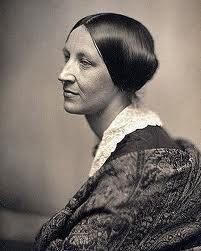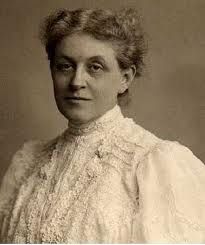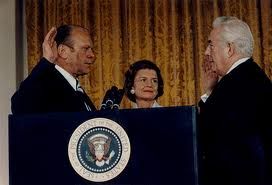Cross posted from The Stars Hollow Gazette
This is your morning Open Thread. Pour your favorite beverage and review the past and comment on the future.
Find the past “On This Day in History” here.
August 18 is the 230th day of the year (231st in leap years) in the Gregorian calendar. There are 135 days remaining until the end of the year.
On this day in 1920, the 19th Amendment to the Constitution is ratified when the Tennessee General Assembly, by a one-vote margin became the thirty-sixth state legislature to ratify the proposed amendment. On August 26, 1920, Secretary of State Bainbridge Colby certified the amendment’s adoption.
 It took 70 years of struggle by women of the Suffrage Movement headed by Susan B. Anthony to get this amendment passed. Gail Collins’ NYT Op-Ed recount of the story puts it in great perspective:
It took 70 years of struggle by women of the Suffrage Movement headed by Susan B. Anthony to get this amendment passed. Gail Collins’ NYT Op-Ed recount of the story puts it in great perspective:
That great suffragist and excellent counter, Carrie Chapman Catt, estimated that the struggle had involved 56 referendum campaigns directed at male voters, plus “480 campaigns to get Legislatures to submit suffrage amendments to voters, 47 campaigns to get constitutional conventions to write woman suffrage into state constitutions; 277 campaigns to get State party conventions to include woman suffrage planks, 30 campaigns to get presidential party campaigns to include woman suffrage planks in party platforms and 19 campaigns with 19 successive Congresses.”
As Ms. Catt tells it and to no one’s surprise the Senate was the biggest obstacle, so the Suffragettes decided to take it to the states and amend all the state constitutions, one by one.

The constitutional amendment that finally did pass Congress bore Anthony’s name. It came up before the House of Representatives in 1918 with the two-thirds votes needed for passage barely within reach. One congressman who had been in the hospital for six months had himself carted to the floor so he could support suffrage. Another, who had just broken his shoulder, refused to have it set for fear he’d be too late to be counted. Representative Frederick Hicks of New York had been at the bedside of his dying wife but left at her urging to support the cause. He provided the final, crucial vote, and then returned home for her funeral.
The ratification stalled short of one state when it came to a vote in the Tennessee Legislature on August 18, 1920 and was short one vote to ratify when a young state legislator got a note from his mother:
Ninety years ago this month, all eyes turned to Tennessee, the only state yet to ratify with its Legislature still in session. The resolution sailed through the Tennessee Senate. As it moved on to the House, the most vigorous opposition came from the liquor industry, which was pretty sure that if women got the vote, they’d use it to pass Prohibition. Distillery lobbyists came to fight, bearing samples.
“Both suffrage and anti-suffrage men were reeling through the hall in an advanced state of intoxication,” Carrie Catt reported.
The women and their allies knew they had a one-vote margin of support in the House. Then the speaker, whom they had counted on as a “yes,” changed his mind.
(I love this moment. Women’s suffrage is tied to the railroad track and the train is bearing down fast when suddenly. …)
Suddenly, Harry Burn, the youngest member of the House, a 24-year-old “no” vote from East Tennessee, got up and announced that he had received a letter from his mother telling him to “be a good boy and help Mrs. Catt.”
“I know that a mother’s advice is always the safest for a boy to follow,” Burn said, switching sides.
We celebrate Women’s Suffrage Day on Aug. 26, which is when the amendment officially became part of the Constitution. But I like Aug. 18, which is the day that Harry Burn jumped up in the Tennessee Legislature, waving his mom’s note from home. I told the story once in Atlanta, and a woman in the audience said that when she was visiting her relatives in East Tennessee, she had gone to put a yellow rose on Harry Burn’s grave.
I got a little teary.
“Well, actually,” she added, “it was because I couldn’t find his mother.”
The rectangular two-and-a-half-mile track linked four turns, each exactly 440 yards from start to finish, by two long and two short straight sections. In that first five-mile race on August 19, 1909, 12,000 spectators watched Austrian engineer Louis Schwitzer win with an average speed of 57.4 miles per hour. The track’s surface of crushed rock and tar proved a disaster, breaking up in a number of places and causing the deaths of two drivers, two mechanics and two spectators.

 It took 70 years of struggle by women of the Suffrage Movement headed by Susan B. Anthony to get this amendment passed.
It took 70 years of struggle by women of the Suffrage Movement headed by Susan B. Anthony to get this amendment passed. 
 Throughout the late 1850s, treaty violations by the United States and late or unfair annuity payments by Indian agents caused increasing hunger and hardship among the Dakota. Traders with the Dakota previously had demanded that the government give the annuity payments directly to them (introducing the possibility of unfair dealing between the agents and the traders to the exclusion of the Dakota). In mid-1862 the Dakota demanded the annuities directly from their agent, Thomas J. Galbraith. The traders refused to provide any more supplies on credit under those conditions, and negotiations reached an impasse.
Throughout the late 1850s, treaty violations by the United States and late or unfair annuity payments by Indian agents caused increasing hunger and hardship among the Dakota. Traders with the Dakota previously had demanded that the government give the annuity payments directly to them (introducing the possibility of unfair dealing between the agents and the traders to the exclusion of the Dakota). In mid-1862 the Dakota demanded the annuities directly from their agent, Thomas J. Galbraith. The traders refused to provide any more supplies on credit under those conditions, and negotiations reached an impasse. On this day in 1935, President Franklin D. Roosevelt signs into law the Social Security Act. Press photographers snapped pictures as FDR, flanked by ranking members of Congress, signed into law the historic act, which guaranteed an income for the unemployed and retirees. FDR commended Congress for what he considered to be a “patriotic” act.
On this day in 1935, President Franklin D. Roosevelt signs into law the Social Security Act. Press photographers snapped pictures as FDR, flanked by ranking members of Congress, signed into law the historic act, which guaranteed an income for the unemployed and retirees. FDR commended Congress for what he considered to be a “patriotic” act. After a three-month siege, Spanish forces under Hernan Cortes capture Tenochtitlan, the capital of the Aztec empire. Cortes’ men leveled the city and captured Cuauhtemoc, the Aztec emperor.
After a three-month siege, Spanish forces under Hernan Cortes capture Tenochtitlan, the capital of the Aztec empire. Cortes’ men leveled the city and captured Cuauhtemoc, the Aztec emperor.

 Alcatraz was an uninhabited seabird haven when it was explored by Spanish Lieutenant Juan Manuel de Ayala in 1775. He named it Isla de los Alcatraces, or “Island of the Pelicans.” Fortified by the Spanish, Alcatraz was sold to the United States in 1849. In 1854, it had the distinction of housing the first lighthouse on the coast of California. Beginning in 1859, a U.S. Army detachment was garrisoned there, and from 1868 Alcatraz was used to house military criminals. In addition to recalcitrant U.S. soldiers, prisoners included rebellious Indian scouts, American soldiers fighting in the Philippines who had deserted to the Filipino cause, and Chinese civilians who resisted the U.S. Army during the Boxer Rebellion. In 1907, Alcatraz was designated the Pacific Branch of the United States Military Prison.
Alcatraz was an uninhabited seabird haven when it was explored by Spanish Lieutenant Juan Manuel de Ayala in 1775. He named it Isla de los Alcatraces, or “Island of the Pelicans.” Fortified by the Spanish, Alcatraz was sold to the United States in 1849. In 1854, it had the distinction of housing the first lighthouse on the coast of California. Beginning in 1859, a U.S. Army detachment was garrisoned there, and from 1868 Alcatraz was used to house military criminals. In addition to recalcitrant U.S. soldiers, prisoners included rebellious Indian scouts, American soldiers fighting in the Philippines who had deserted to the Filipino cause, and Chinese civilians who resisted the U.S. Army during the Boxer Rebellion. In 1907, Alcatraz was designated the Pacific Branch of the United States Military Prison. In 1829, James Smithson died in Italy, leaving behind a will with a peculiar footnote. In the event that his only nephew died without any heirs, Smithson decreed that the whole of his estate would go to “the United States of America, to found at Washington, under the name of the Smithsonian Institution, an Establishment for the increase and diffusion of knowledge.” Smithson’s curious bequest to a country that he had never visited aroused significant attention on both sides of the Atlantic.
In 1829, James Smithson died in Italy, leaving behind a will with a peculiar footnote. In the event that his only nephew died without any heirs, Smithson decreed that the whole of his estate would go to “the United States of America, to found at Washington, under the name of the Smithsonian Institution, an Establishment for the increase and diffusion of knowledge.” Smithson’s curious bequest to a country that he had never visited aroused significant attention on both sides of the Atlantic.